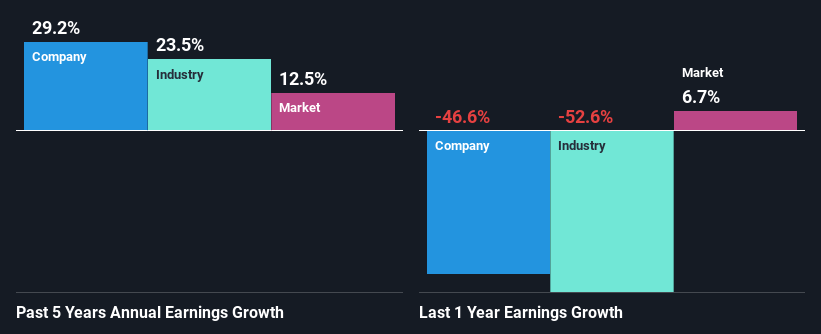- United Kingdom
- /
- Oil and Gas
- /
- LSE:SHEL
Shell plc's (LON:SHEL) Stock Is Going Strong: Have Financials A Role To Play?

Shell (LON:SHEL) has had a great run on the share market with its stock up by a significant 7.9% over the last month. As most would know, fundamentals are what usually guide market price movements over the long-term, so we decided to look at the company's key financial indicators today to determine if they have any role to play in the recent price movement. Specifically, we decided to study Shell's ROE in this article.
Return on equity or ROE is a key measure used to assess how efficiently a company's management is utilizing the company's capital. Simply put, it is used to assess the profitability of a company in relation to its equity capital.
Check out our latest analysis for Shell
How Is ROE Calculated?
ROE can be calculated by using the formula:
Return on Equity = Net Profit (from continuing operations) ÷ Shareholders' Equity
So, based on the above formula, the ROE for Shell is:
8.4% = US$16b ÷ US$190b (Based on the trailing twelve months to September 2024).
The 'return' is the amount earned after tax over the last twelve months. That means that for every £1 worth of shareholders' equity, the company generated £0.08 in profit.
Why Is ROE Important For Earnings Growth?
So far, we've learned that ROE is a measure of a company's profitability. We now need to evaluate how much profit the company reinvests or "retains" for future growth which then gives us an idea about the growth potential of the company. Assuming everything else remains unchanged, the higher the ROE and profit retention, the higher the growth rate of a company compared to companies that don't necessarily bear these characteristics.
A Side By Side comparison of Shell's Earnings Growth And 8.4% ROE
On the face of it, Shell's ROE is not much to talk about. Yet, a closer study shows that the company's ROE is similar to the industry average of 8.4%. Particularly, the exceptional 29% net income growth seen by Shell over the past five years is pretty remarkable. Given the slightly low ROE, it is likely that there could be some other aspects that are driving this growth. For example, it is possible that the company's management has made some good strategic decisions, or that the company has a low payout ratio.
As a next step, we compared Shell's net income growth with the industry, and pleasingly, we found that the growth seen by the company is higher than the average industry growth of 23%.

Earnings growth is a huge factor in stock valuation. It’s important for an investor to know whether the market has priced in the company's expected earnings growth (or decline). This then helps them determine if the stock is placed for a bright or bleak future. Is SHEL fairly valued? This infographic on the company's intrinsic value has everything you need to know.
Is Shell Making Efficient Use Of Its Profits?
The three-year median payout ratio for Shell is 35%, which is moderately low. The company is retaining the remaining 65%. So it seems that Shell is reinvesting efficiently in a way that it sees impressive growth in its earnings (discussed above) and pays a dividend that's well covered.
Additionally, Shell has paid dividends over a period of at least ten years which means that the company is pretty serious about sharing its profits with shareholders. Upon studying the latest analysts' consensus data, we found that the company is expected to keep paying out approximately 39% of its profits over the next three years. Still, forecasts suggest that Shell's future ROE will rise to 11% even though the the company's payout ratio is not expected to change by much.
Conclusion
On the whole, we do feel that Shell has some positive attributes. With a high rate of reinvestment, albeit at a low ROE, the company has managed to see a considerable growth in its earnings. That being so, a study of the latest analyst forecasts show that the company is expected to see a slowdown in its future earnings growth. To know more about the latest analysts predictions for the company, check out this visualization of analyst forecasts for the company.
New: Manage All Your Stock Portfolios in One Place
We've created the ultimate portfolio companion for stock investors, and it's free.
• Connect an unlimited number of Portfolios and see your total in one currency
• Be alerted to new Warning Signs or Risks via email or mobile
• Track the Fair Value of your stocks
Have feedback on this article? Concerned about the content? Get in touch with us directly. Alternatively, email editorial-team (at) simplywallst.com.
This article by Simply Wall St is general in nature. We provide commentary based on historical data and analyst forecasts only using an unbiased methodology and our articles are not intended to be financial advice. It does not constitute a recommendation to buy or sell any stock, and does not take account of your objectives, or your financial situation. We aim to bring you long-term focused analysis driven by fundamental data. Note that our analysis may not factor in the latest price-sensitive company announcements or qualitative material. Simply Wall St has no position in any stocks mentioned.
About LSE:SHEL
Shell
Operates as an energy and petrochemical company Europe, Asia, Oceania, Africa, the United States, and other Americas.
Flawless balance sheet and undervalued.
Similar Companies
Market Insights
Community Narratives


